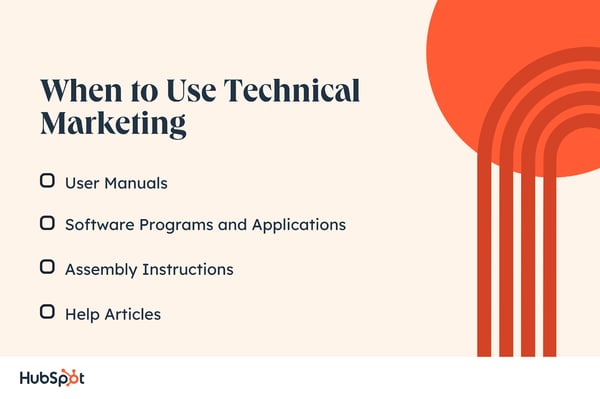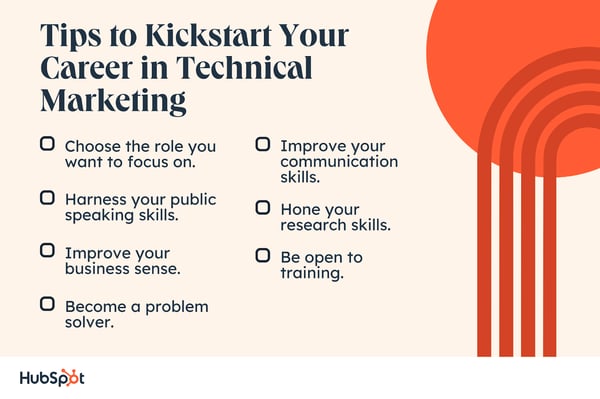You’ll need a solid technical marketing strategy if you sell a complex product or service.
You’ll need a solid technical marketing strategy if you sell a complex product or service.
This type of marketing requires a firm understanding of the technical aspects behind your product. You’ll also need to communicate complex processes clearly. Without technical expertise, your marketing team will have a difficult time developing content that resonates with your core audience.
In this post, we’ll look at why technical marketing is so important, as well as the skills necessary to succeed in a technical marketing role.
Table of Contents
- When to Use Technical Marketing
- Technical Marketing Best Practices
- 7 Tips to Kickstart Your Career in Technical Marketing
What is technical marketing?
Technical marketing refers to a specific type of marketing focusing primarily on an offering’s specifications and technical aspects.
Technical marketing communicates and simplifies complex information, usually about specialized products.
When to Use Technical Marketing
Technical marketing is a crucial part of any marketing strategy. It’s particularly important to use when consumers are very knowledgeable about the subject matter and have a detailed understanding of the product or service.
A general overview may work for some industries or products. But for someone who knows the ins and outs of your industry already, they’ll want more in-depth information.
A few industries that benefit from technical marketing the most include:
- Software
- Manufacturing
- Healthcare
- Aerospace
- Electronics
Within these industries, there are some scenarios when technical marketing is most beneficial in helping marketing teams communicate with customers, generate quality leads, and meet their business goals.

User Manuals
Technical marketing details how a product or service works. These marketers specifically focus on how the offering will benefit the user.
This is typically more necessary in technical fields where the products are more complex, such as engineering or electronics.
A user manual, also referred to as a user guide or instruction manual, is documentation that provides a user with a detailed explanation of how to use a product or service.
Software Programs and Applications
Another crucial use case for technical marketing is creating documentation for software programs and applications.
This can include documentation for developers, as well as customer-facing documentation for product-savvy consumers.
Assembly Instructions
If you’ve ever had to build a piece of IKEA furniture, then you know that simplifying complex processes can significantly affect the user experience.
This use case is unique to products that need to be constructed or assembled, such as manufacturing parts, electronics, or furniture.
Help Articles
Help center articles, product walk-through videos, and anything else that provides in-depth instruction all fall under how-to content.
You’ll need technical writing experience, critical thinking skills, and product insights to produce this technical marketing content.
Technical Marketing Best Practices
Understand your audience.
Marketing is all about understanding your audience’s needs and pain points to navigate them toward a useful solution.
Yet typically, this form of marketing will require an even greater dose of creativity, with a need to continually search for new avenues to make technical and complex products and services easy to understand.
Whether you’re a technical marketing manager or a technical writer, you will need a complete understanding of a product or service’s USPs, capabilities, and benefits. And this should outweigh the customer’s understanding. No questions should be left unanswered.
Technical marketing requires in-depth audience research and critical thinking. You must be able to think like your customer so you know how to communicate with them in a way that will resonate, educate, and drive leads.
Sharpen your industry knowledge.
To excel in technical marketing, it’s essential to understand the ins and outs of the industry. Stay on top of the latest developments, trends, and tools. Then, you’ll know what your audience is consuming.
Sharpening your industry knowledge is beneficial in helping you better understand your customer and position your brand as an expert in your field.
This can also give your online presence a boost. How?
Google’s latest update — referred to as EEAT — prioritizes content that demonstrates four things:
- Experience
- Expertise
- Authoritativeness
- Trustworthiness
This is a huge opportunity for technical marketers to use content to build their brand’s authority on a certain topic or product.
Create content that covers technical aspects of a service or product and demonstrates your company as an expert in the space. If it’s done properly, then this will improve your search rankings.
Get product training.
When you’re new to your role or company, the first thing you should do is get in-depth training on your company’s product.
Meet with someone on the product or engineering team to walk through the product’s front end and back end since you’ll want to experience the product as both a user and as an internal member.
By walking through the user experience, you can identify any technical aspects that could use better marketing or more thorough communication.
On the flip side, it’s also essential for a technical marketer to fully understand how a product or process works in order to translate that information to the end user throughout your marketing efforts.
Lean into storytelling.
While technical marketing may revolve around data, detailed specifications, and thorough instruction, that doesn’t mean you can’t also infuse storytelling elements into your content.
Lean into the “marketing” aspect that goes into technical marketing. Don’t be afraid to get creative when crafting your content.
Put yourself in the user’s shoes to better understand their perspective and help you tell a story. Telling a story not only helps communicate complex topics, but it’s also a great way to help users visualize themselves using your product.
7 Tips to Kickstart Your Career in Technical Marketing
So what does it take to have a successful technical marketing career? There are certainly some key characteristics necessary for this role, and some definite skills to hone.
Here are seven tips to help kickstart your career as a marketer in a technical field.

1. Choose the role you want to focus on.
If you’re thinking about a career in technical marketing, there are several roles you can hone in on.
Whether you’re experienced in the strategy side or consider yourself more of a technical wordsmith, here are a few roles you can expect to find in a technical marketing career path.
Technical Marketing Manager
This role encompasses all of the technical marketing activities for an organization. It’s essential that a technical marketing manager has wider business knowledge to understand the ROI for the specific product, as well as the product’s use cases.
Broad industry knowledge is also a must, with an understanding of complementary or substitute products on the market.
For example, if you think about your prospect’s existing subscriptions or tool stack, a detailed overview of the specifications and limitations of your product will highlight where your offering will complement or overlap with their existing tools.
Technical Content Marketer
This role focuses more specifically on ways to use content to communicate your technical message.
Technical Marketing Writer
A technical marketing writer is responsible for communicating the overall marketing and messaging strategies to paper (or video, as the case may be).
As a writer, your content will be the driving force behind generating more qualified leads. It’s essential to understand the industry jargon your customer uses.
2. Harness your public speaking skills.
This may be unexpected, but public speaking is an incredibly important skill in technical marketing.
Given that the content that tends to perform well are conferences, videos, and presentations, a technical marketer must be able to communicate technical aspects in this thought leadership setting.
Whether you need to walk through the product for a demo or you’re hosting a webinar for potential customers, get yourself used to speaking (even if it’s in a virtual environment) if you want to succeed in technical marketing.
3. Improve your business sense.
It’s essential that a technical marketing manager or strategist has wider business knowledge. This helps you understand the ROI for the specific product but also the product’s use cases.
Wider industry knowledge is also a must, with a particular understanding of complementary or substitute products on the market.
For example, if you think about your prospect’s existing subscriptions or tool stack, a detailed overview of the specifications and limitations of your product will highlight where your offering will complement or overlap with their existing tools.
With more involvement in business operations, your concrete understanding of your product’s specifications will be necessary to better explain where the features are adding value.
Best for: If you want to lead a technical marketing team and equip them with the budget and resources needed to get results, you have to get buy-in from executives. This means you must be able to communicate the value of your program and be able to show how it’s impacting the company’s business goals and bottom line.
4. Become a problem solver.
Ultimately, technical marketing is all about helping consumers solve their problems.
To succeed in a technical marketing career, it’s important to be consultative and empathetic. This allows you to explore and further advise a prospect’s decision-making processes by continually looking at specific needs.
Best for: If you have your sights set on a management or leadership role at some point in your marketing career, then you have to improve your problem-solving skills.
5. Improve your communication skills.
From writing in-depth user guides to crafting video script copy for demos, technical marketers must always work on their communication skills to succeed in this career — particularly when it comes to written communication.
As we mentioned, you need to understand your personas from a content platform perspective, but you’ll also need to know how to write for them.
This includes tone of voice: is it appropriate to write it simplistically? Or will it be more fitting to include industry jargon?
Your brand’s content needs to live and breathe the product or service it’s related to and the audience that desires it. Whether this be through product descriptions, web pages, or more general industry-related content that will drive traffic, excellent communication skills are essential.
Best for: If you want to pursue a role in technical writing, then excellent communication skills are a must.
6. Hone your research skills.
To kickstart your technical marketing career, you’ll also need strong research skills. Being an excellent researcher is important for a couple of reasons.
For one, research helps you gather the most up-to-date knowledge on wider market trends. Being a researcher also helps you with the ability to retain and communicate your learnings to consumers, and showcase it in communication such as user guides.
Pro tip: Join online communities and discussion forums to connect with people in the industry and stay on top of the latest conversations.
7. Be open to training.
Another content form that lends itself well to technical marketing is training courses on the products and services offered. If your company wants to produce this type of content, then great training skills are necessary, both for online and in-person technical training.
Practice your training skills by producing video walk-throughs and getting comfortable explaining complex processes or products in person instead of on paper.
Pro tip: You should also receive regular training on your company’s product and industry-related topics. Attending training sessions or courses can help you better refine your own training skills.
Taking the Technical Marketing Leap
Ultimately, technical marketing can be a really important component of your content marketing strategy if your industry or products and services lend themselves to it.
Technical marketing can help you attract more qualified leads and showcase your company as an expert in the industry.
Create a clear technical marketing strategy so that you can cut through the marketing noise and deliver an exciting and engaging message to your well-informed audience.
![]()



![Download Now: Free Marketing Plan Template [Get Your Copy]](https://no-cache.hubspot.com/cta/default/53/aacfe6c7-71e6-4f49-979f-76099062afa0.png)
